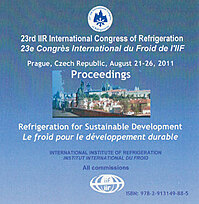
Document IIF
Étude expérimentale de la performance d'un conditionneur d'air automobile en fonction de la chute de pression dans l'ensemble des tuyauteries du système de refroidissement.
Experimental study of automotive air-conditioner performance as a function of pressure drop in the refrigerant pipe system layout.
Numéro : pap. ID: 671
Auteurs : PEREIRA L. V. M., SENA V. L. R., PEREIRA C. C., et al.
Résumé
The layout of automotive air-conditioning pipe system is becoming a complex issue due to increasing space restrictions, as a result of downsizing to reduce vehicle weight and, consequently, fuel consumption and pollutant emissions. Pipe system layout directly influences pressure drop and, thus, air-conditioner performance. This work presents an experimental study on the influence of pipe system layout of an automotive air conditioner with variable compression ratio. Experiments were performed in prototypes of compressor suction pipes of different geometries and dimensions. The air-conditioner performance was evaluated simulating real vehicle operating conditions through cool down tests carried out in a cold chamber. The results allowed for the definition of the best pipe system layout to provide high refrigeration system performance and low temperature in the vehicle cabin.
Documents disponibles
Format PDF
Pages : 6 p.
Disponible
Prix public
20 €
Prix membre*
Gratuit
* meilleur tarif applicable selon le type d'adhésion (voir le détail des avantages des adhésions individuelles et collectives)
Détails
- Titre original : Experimental study of automotive air-conditioner performance as a function of pressure drop in the refrigerant pipe system layout.
- Identifiant de la fiche : 30002121
- Langues : Anglais
- Source : Proceedings of the 23rd IIR International Congress of Refrigeration: Prague, Czech Republic, August 21-26, 2011. Overarching theme: Refrigeration for Sustainable Development.
- Date d'édition : 21/08/2011
Liens
Voir d'autres communications du même compte rendu (569)
Voir le compte rendu de la conférence
Indexation
-
Investigation of pressure drop in refrigerant p...
- Auteurs : MEINERT R., SCHMITZ G.
- Date : 05/2021
- Langues : Anglais
- Source : 2021 Purdue Conferences. 18th International Refrigeration and Air-Conditioning Conference at Purdue.
- Formats : PDF
Voir la fiche
-
Development of the indoor heat exchanger with s...
- Auteurs : MATSUDA T., AOKI M., LEE S., et al.
- Date : 17/02/2010
- Langues : Anglais
- Source : Measures to address climate change. 2010 International Symposium on Next-generation Air Conditioning and Refrigeration Technology: February 17-19, Tokyo, Japan.
- Formats : PDF
Voir la fiche
-
Investigation of the pressure behaviour with co...
- Auteurs : CHEN Y., GU J., WANG S.
- Date : 21/08/2007
- Langues : Anglais
- Source : ICR 2007. Refrigeration Creates the Future. Proceedings of the 22nd IIR International Congress of Refrigeration.
- Formats : PDF
Voir la fiche
-
HFC-152a as the alternative refrigerant.
- Auteurs : HILL W. R.
- Date : 10/02/2003
- Langues : Anglais
- Source : MAC Summit 2003. Options to reduce greenhouse gas emissions due to mobile air conditioning [CD-ROM].
Voir la fiche
-
Oil effect on performance of automobile A/C sys...
- Auteurs : LIU X., HRNJAK P.
- Date : 11/07/2016
- Langues : Anglais
- Source : 2016 Purdue Conferences. 16th International Refrigeration and Air-Conditioning Conference at Purdue.
- Formats : PDF
Voir la fiche
